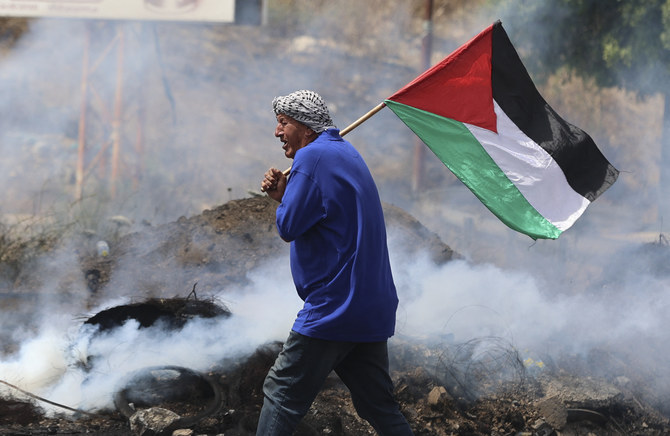CHICAGO: Illinois Congresswoman Marie Newman told constituents on Sunday they “can make a difference” in strengthening US support for Palestinian rights, and to curb excessive funding demands by Israel.
Newman was one of only nine House of Representatives members who voted against a bill last week giving Israel $1 billion to purchase more short-range missiles for its Iron Dome defense system.
Speaking at the Palestine American Club in the Chicago suburb of Bridgeview, Newman urged Americans to target donors who give hundreds of millions of dollars to the Senate’s 100 members as a means of forcing change.
“Start talking to senators. Remember, in Congress, in the House of Representatives, we only have the purse that we can deal with. We (members of Congress) can only say yea or nay to money,” Newman explained, noting that the House addresses funding while the Senate and administration addresses policy.
“So, that is why the Iron Dome vote is important, right? It is to say, ‘No, Israel. You can’t have another billion dollars.’ What we have to do is start talking to people who actually make policy.”
Congress voted on Sept. 23 to separate Israel’s Iron Dome vote from the larger and stalled vote to fund American news. The US already gives Israel $500 million annually for the missile defense system under an agreement signed by President Barack Obama in 2016.
Arab Americans denounced Congress for removing the Iron Dome funding vote from the larger spending bill that remains stalled in partisan, political bickering. Another attempt to pass it may not take place until Thursday.
“Instead of passing a bill to address the immediate and critical needs of the American people in the larger spending bill, Congress put Israel above the American people and removed the Iron Dome funding so Israel would not have to wait the way American taxpayers are waiting and suffering,” said Hassan Nijem, president of the American Arab Chamber of Commerce of Chicagoland, which co-sponsored Newman’s appearance.
“It’s shameful when 420 members of Congress vote so quickly to give Israel, a foreign country, $1 billion. But they can’t seem to find the time or the courage to help American citizens overcome their challenges.”
Newman was among nine members of Congress who voted against the Iron Dome appropriation. The nine were immediately attacked by Israel’s UN Ambassador Gilad Erdan on Monday who said they were “either ignorant or anti-Semitic.”
Newman did not address Erdan’s personal attacks, and instead focused on how US citizens can get their government to reprioritize spending to address their needs.
She said that activists need to focus on the corporations, businesses and individuals who donate hundreds of millions of dollars to Senate members who are responsible for defining so-far failed US policy efforts to achieve peace in the Middle East.
“So, you have to start talking to their donors and you have to start making them realize this is an important humanitarian issue, and that everybody is safer in the region when Palestine is safe and free and able to move, and be healthy and prosperous — everybody will be happier,” Newman said.
Newman said she is also working to reinforce communications between Arab and Muslim Americans and the staff of Secretary of State Antony Blinken, announcing the creation of an Arab and Muslim American Council in the 3rd District.
“We have to start talking to the senators and we have to start talking with the administration.”
Newman also addressed the continued human rights “crisis” in Sheikh Jarrah in the occupied West Bank city of East Jerusalem, where Israel is taking homes and property from Christian and Muslim civilians and giving them to Jewish settler organizations.
“I always like to be very clear that this is home theft. When you steal someone’s house and you are a victim, it is called home theft. It is not right here in Chicago. It is not right in Palestine. It is not right in Montreal. It is not right in Hong Kong,” Newman said.
“So, we put together a letter that typically would only be signed by seven, eight or nine members of Congress. But because my team is amazing, and I decided to do a lot of outreach and to be very tenacious, we had 25 members of Congress sign on to the letter.”
Most of Newman’s remarks addressed the needs of the 3rd Congressional District, explaining that she is supporting an infrastructure bill that would provide economic and educational support to families hard pressed by the nearly two-year long pandemic.
“Roads and bridges bring lots of jobs. On the human infrastructure side of the package, it will bring paid leave, universal child care, two years of community college free for young people, middle-aged people or our elders who want to go back to school,” she said.
The proposed spending bill that remains deadlocked in the House would increase deductions for small businesses and reduce taxes between 5-10 percent. She also said that the spending bill provides funding to improve the nation’s infrastructure to improve the environment, and help Americans facing financial and health difficulties.
A first-term member of Congress, Newman was elected to represent the 3rd Congressional District in November 2020. The district has been held by a Democrat since 1975 and is overwhelmingly Democratic. It was ranked as having the eighth-largest Arab-American population of 50 American congressional districts by The New York Times, and largest concentration of Palestinian-American voters.

























